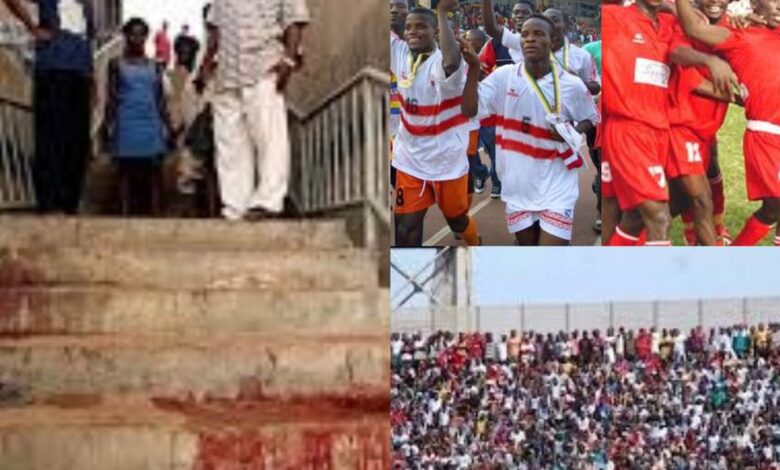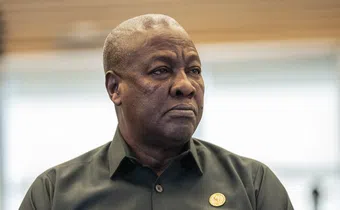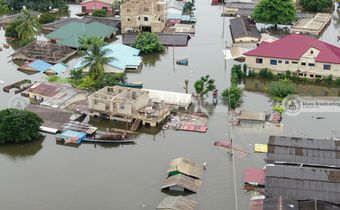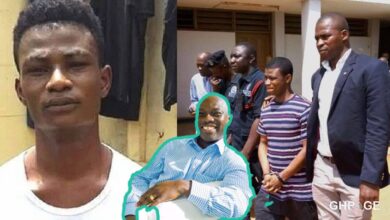May 9 Accra Sports stadium disaster: Darkest day in GhanaÔÇÖs football history

The Accra Sports Stadium disaster on 9 May 2001 remains the worst stadium tragedy in Ghana and across Africa, claiming 127 lives and leaving an unforgettable mark on the countryÔÇÖs sporting history.
It was supposed to be a thrilling match between GhanaÔÇÖs top two football clubs, Accra Hearts of Oak and Asante Kotoko at the Ohene Djan Stadium in Accra.
With thousands of fans filling the stands, emotions ran high as Hearts of Oak came from behind to win 2ÔÇô1 with two late goals. Lawrence Adjei opened the scoring for the Porcupine Warriors before two late strikes from deadly striker Ishmael Addo helped the Phobians grab all three points.
Disappointed Kotoko supporters claimed the linesman had raised his flag for an infringement leading to the goal. However, the referee on the day Wilson Sey said he gave an advantage because the supposed foul was on Hearts of OakÔÇÖs attacking player.
A candid moment between two top artists has sparked buzz ahead of this year’s biggest music event.
This decision was not accepted in good faith by the visiting supporters, and they began throwing plastic seats and bottles onto the pitch. Tensions heightened and the situation grew into full-fledged chaos.
Police fire teargas in attempt to control crowd
To control the situation, the police fired tear gas into the stands. This caused panic among the crowd. Fans scrambled to escape the choking fumes, but many of the stadium gates were locked. With fewer exits than originally designed, the rush quickly turned into a deadly stampede.
The Ghana Institute of Architects later described the stadium as a ÔÇťdeath trap.ÔÇŁ
127 lives unfortunately lost
When the chaos ended, 127 people had lost their lives. 116 due to suffocation from the crush and 11 from other injuries.
READ ALSO: Referee burned alive to death by angry mob in DR Congo
Bodies, both conscious and unconscious, flooded the 37 Military Hospital and Ridge Hospital in Accra. Families thronged these hospitals and other nearby clinics in search for their loved ones.
One survivor, Abdul Mohammed, had been taken to the morgue after losing consciousness, only to wake up when someone stepped on his foot, narrowly escaping being buried alive.
Eyewitnesses said there were no medical personnel available when the tragedy unfolded, as many had already left the stadium. This lack of emergency response added to the number of deaths.
Deputy Minister of Youth and Sports at the time, Joe Aggrey, told the BBC that the scene was horrific, with ÔÇťpiles of bodies on the stadium floor.ÔÇŁ
Investigations into disaster
Following the disaster, an official investigation found that the police had overreacted by using tear gas and plastic bullets. They were also accused of acting carelessly and dishonestly.
Six police officers were charged with manslaughter, but the court later ruled that there was not enough evidence to prove the gas caused the deaths, stating instead that the stampede was the likely cause.
The inquiry recommended better stadium safety, first aid stations, and rapid response teams for emergencies. In 2007, the Accra Sports Stadium was renovated to meet FIFA standards
The nation mourned deeply. President John Agyekum Kufuor declared three days of national mourning, and the Ghana Premier League was suspended for a month.
May 9 memorial
Every year since, the disaster is remembered through the “May 9th Remembered” memorials led by former Asante Kotoko chairman Herbert Mensah.
The memorial events include visits to families of the victims, donations to those in need, and prayers. A memorial walk is held in Kumasi, and in 2016, the “May 9th Cup” was introduced to honour the victims through football.
A statue called “I Am My BrotherÔÇÖs Keeper” now stands outside the stadium, showing one fan carrying another to safety.
Fans who attend games at the stadium today often chant ÔÇťNever Again! Never Again!ÔÇŁ as a reminder of the lives lost and a promise to prevent such a tragedy from happening again.
The May 9 Stadium Disaster remains a painful reminder of the need for proper safety and respect for human life in sport.
Hence, the recent acts of hooliganism in the nation’s domestic leagues have raised concerns about fan safety and whether any lessons have been learnt from the disaster over two decades ago.
MUST READ: 5 disturbing acts of hooliganism in Ghana football over the last decade
Today, just like every other May 9, a memorial event is being held at the Accra Sports Stadium led by the National Sports Authority Director General, Yaw Ampofo Ankrah, Sports and Recreation Minister, Kofi Iddie Adamas, representatives of both clubs, the Ghana Football Association (GFA) and security officials.








